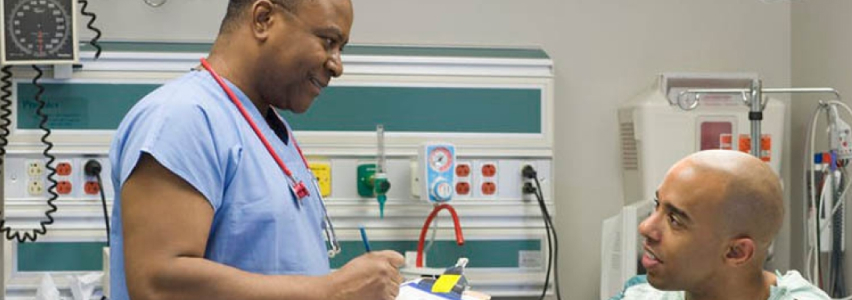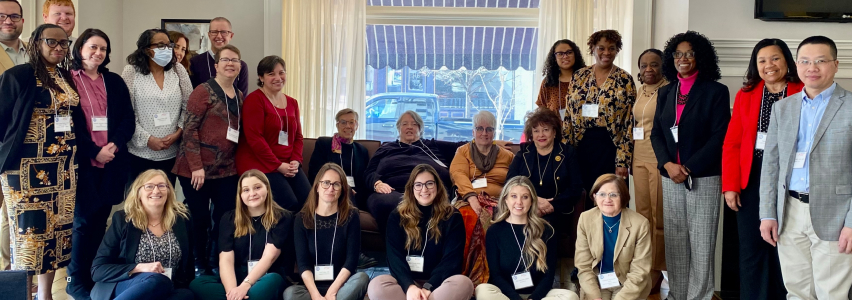About Us : Overview

Who We Are
The Health Resources and Services Administration’s (HRSA) HIV/AIDS Bureau (HAB) administers the AETC Program as a component of the Ryan White HIV/AIDS Treatment Extension Act of 2009 (Public Law 111-87 under Section 2692 of the Public Health Service Act 42 U.S.C. 300ff-111(a), known as the Ryan White HIV/AIDS Program (RWHAP). The AETC Program is the only U.S. network of HIV clinical experts and educators providing tailored education programs, consultation, and technical assistance (TA) to all healthcare teams and systems.
The AETCs are the training arm of the Ryan White HIV Program and increase knowledge and clinical competencies of interdisciplinary teams of care providers to provide HIV care and treatment to persons with HIV with a focus on medically underserved urban and rural areas aimed at treating persons with the chronic disease of HIV.
Part F supports eight regional AETCs and two national AETC centers:
1. The 8 regional AETCs train health care providers to counsel, diagnose, treat, and medically
manage people with HIV and to help prevent HIV transmission.
2. The National AETC Support Center serves to support the network and disseminate the work of the regional AETCs and the National HIV Curriculum (NHC) across the US and its territories.
3. The National Clinician Consultation Center (NCCC) provides timely and appropriate responses
to clinical questions related to HIV infection and other infectious diseases and comorbidities.
What is the work of the AETC Program?
1 Increase the size and strengthen the skills of the current HIV clinical workforce.
2. Improve outcomes along the HIV care continuum, including diagnosis, linkage to care, retention in care, and viral suppression.
3. Decrease HIV transmission and reduce HIV incidence by increasing skills/knowledge of the workforce.
4. Conduct targeted, interdisciplinary education and training programs, and clinical consultation, for health care providers treating people with and at increased risk for HIV.
5. Build the capacity of clinics and care teams to provide biomedical prevention, testing, and treatment for HIV and its comorbidities; and,
6. Develop the future workforce by working with health profession schools to integrate HIV and interprofessional education into their curricula.
The Value of the AETC Program
1. Regional AETCS provide a national reach and local presence and are uniquely positioned to address the needs of providers rapidly to provide optimal HIV care for rural, urban, and suburban communities.
2. Regional AETCs provides timely clinician-to-clinician consultation on HIV-related care.
3. Regional AETCs concentrate on reaching professionals who have direct patient care responsibilities for people with HIV, especially in geographic areas where there are increased rates of infection.
4. Regional AETCs work directly with Ryan White funded programs and FQHCs.
5. Regional AETCs are able to respond to emerging infectious disease outbreaks, such as with the COVID 19 when the AETCS were called upon to conduct training.
6. Regional AETCs promotes the use of the National HIV Curriculum to support an increase in competencies of practicing clinicians of all disciplines including physicians, nurses, nurse practitioners, midwives, physician assistants, pharmacists, and dentists.
7. Regional AETCs collaborate with other federally funded training centers for synergistic efforts to address the syndemics related to HIV, such as substance use, mental health, and hepatitis.
8. Regional AETCs enhance and deliver a well-trained workforce who can offer timely and ongoing treatment to prevent HIV progression and early death which reduces late entry of persons with HIV into treatment, thereby reducing hospitalizations, emergency room visits, and overall cost of care.
MAAETC educates 14,000 individual care providers every year through the states of Pennsylvania, Maryland, DC, Delaware, Virginia, and West Virginia
How Does the MAAETC Program Build and Maintain an HIV Clinical Workforce?
1. MAAETC promotes early diagnosis, rapid linkage to effective treatment, prevention of new transmissions.
2. MAAETC supports HIV and primary care clinics to treat people with HIV resulting in viral suppression and reducing HIV community transmission.
3. MAAETC trains 14,000 individual HIV care providers every year with the majority providing direct clinical services, HIV testing, and offering and prescribing PrEP.
4. MAAETC responds with training and TA in the event of rural and urban HIV outbreaks to ramp up HIV testing and linkage to treatment.
5. MAAETC trains clinicians on recent biomedical prevention and treatment advances, including long- acting injectables, to support patient retention in care and viral load suppression.
6. MAAETC increases the capacity of providers to manage co-morbidities, such as hepatitis B and C, sexually transmitted infections, substance use and mental health disorders.
7. MAAETC increases provider awareness of stigma and past trauma as a barrier to care for people with HIV to reduce people dropping out of care.
8. MAAETC also works closely with the National Clinical Consultation Center which provides over 12,000 consultations annually to support providers’ decision making on HIV treatment, prevention and its comorbidities.
9. MAAETC translates the latest scientific and evidence-based approaches into practice to increase effective treatment and maintenance of health.
10. MAAETC major focus is on providing comprehensive care and support for the chronic disease of HIV addressing its occurrence throughout the lifespan to pregnant women, children, adolescents, adults, and the elderly.
11. MAAETC addresses geographic, culture, and other barriers to care access and maintenance in care.
12. MAAETC addresses the medical comorbidities of HIV including hepatitis, sexually transmitted infections, substance use, and mental illness.
13. MAAETC equips the healthcare system to address the needs of people aging with HIV and working with primary care providers to integrate HIV into geriatric services.
14. MAAETC trains new, novice and clinicians with few patients with HIV, who need extra support, to increase the healthcare workforce, which is essential due to retirement and attrition of the existing workforce.
15. MAAETC increases capacity to address the complex life circumstances in of persons with HIV in order to support their growth, work, family, and communities within states, regions, cities and towns.
PROGRAM GOALS

Enhances HIV clinical treatment and prevention skills, as well as the acquisition of new skills and knowledge with didactic and skill-building training.
Conducts clinical preceptorships/mini residencies for community clinicians, utilizing AETC clinical experts to improve clinical skills and foster capacity building.


Provides expert clinical consultation to ensure “best practices” for treatment, offers treatment co-management, and refers patients to clinical experts.
Improves access to a comprehensive HIV care system for populations with reduced access to care through its Minority AIDS Initiative, providing special training and capacity building to clinicians, agencies, and clinics.


Trains local providers and others serving medically underserved populations, to build clinical capacity in local communities.
Creates and maintains a high standard of HIV care through training and technical assistance for RWHAP-funded agencies and programs to increase quality of care, reduce barriers, and improve access.


Conducts capacity building at new, emerging, and established community medical service sites including RWHAP clinics, federally qualified health centers (FQHCs), and other sites to address quality and system gaps.
Trains clinicians on how to provide culturally appropriate interventions and care.


Provides training in the prenatal and gynecological care of women, including how to reduce perinatal transmission through appropriate screening, testing, and medication protocols.
Offers specialized training to correctional clinical providers in state, county, and federal prison systems.


Provides quality management training to agencies providing HIV care to ensure that treatment protocols are continually revised to reflect the current standard of care based on the latest research and best practices.
Trains clinicians on comorbidities of substance use, hepatitis, sexually transmitted infections, tuberculosis, and mental health disorders in persons with HIV, in collaboration with other federally funded training centers.


Conducts ongoing needs assessments of institutions, clinics, programs, and individual clinicians, so that training can be tailored.
Rapidly disseminates information on advances in treatment via print, teleconferences, and the MidAtlantic AETC website.


Conducts regular evaluation studies to measure changes in provider knowledge, clinician practice patterns and decision making, patient care outcomes, and HIV care system enhancements.
SCOPE AND REACH OF MAAETC INTERVENTION

The MidAtlantic AIDS Education and Training Center devotes considerable time and travel from our staff to reach locations throughout the region to engage individual clinicians, agencies and programs to conduct assessments, identify training topics, arrange logistics, networking with communities and develop programming tailored to regional and local needs. Furthermore, the location of training programs demonstrates that our expert faculty travel to reach all areas of our region demonstrating our commitment to improving the clinical knowledge and skills of our audiences to improve the quality of care for persons with HIV.
Rural areas of the region have been hard hit with the loss of industry, resulting in high rates of poverty within all age groups. There has also been an increase in drug and alcohol use in these areas, which contributes to the growing rates of STI and HIV infection within rural and medically underserved areas.
These factors provide justification and a rationale for the need for AETC intervention to equip health care providers in these areas with the knowledge and skills not just on HIV but STIs, hepatitis, substance use, and psychiatric co-morbidities of HIV. In addition, there is a tremendous need for capacity building through training and technical assistance to enhance healthcare infrastructure, policies, and procedures, thereby improving service delivery.
TARGETED TRAINING AUDIENCES
The MidAtlantic AIDS Education and Training Center offers education and training programs specifically designed to improve HIV/AIDS care, treatment, and prevention services for:
- Physicians
- Nurses
- Physician Assistants
- Nurse Practitioners
- Dentists
- Dental Hygienists
- Pharmacists
- Social workers
- Case managers
- All members of interdisciplinary care teams
The most effective educators guide their teaching based on the principles of adult learning. The MidAtlantic AETC is proud of its tradition of training and education, which is based on the unique needs of trainees and provides the foundation for workshops, seminars, symposia, preceptorships, teleconferences, and other training sessions that prepare providers and clinicians to provide effective HIV prevention, care, and treatment.
The MidAtlantic AIDS Education and Training Center takes great care to identify faculty and trainers who provide education that considers local versus regional or national expertise, and matches faculty to audience needs, such as discipline, practice setting, and prior experience with the patient population. Audience identification with the faculty serves as a catalyst for the participant to learn, provide quality care, and agree to ongoing follow-up opportunities.
The AETC training team considers numerous variables in determining the appropriate faculty for all levels of training and selects from a developed pool of expert faculty that encompasses all targeted disciplines. AETC staff coach each faculty member on the identified audience and their needs, including recent guidelines and specific issues, and attend all programs to assess faculty performance and conduct evaluations.
The MidAtlantic AIDS Education and Training Center trains health professionals from various backgrounds and locations throughout the region. Training is tailored to meet the HIV prevention, care, and treatment challenges of specific geographic areas, clinics, and individual clinicians. The MidAtlantic AIDS Education and Training Center works diligently to prepare providers with skills and knowledge that are tailored to the populations they serve. This individualized focus is a key element of the center’s success.



